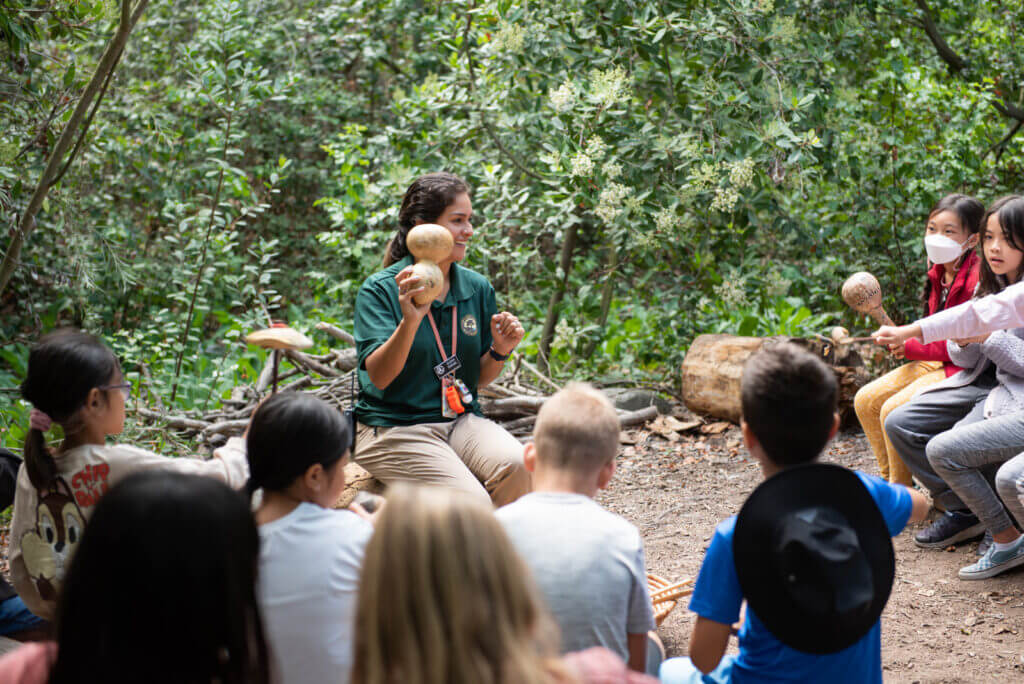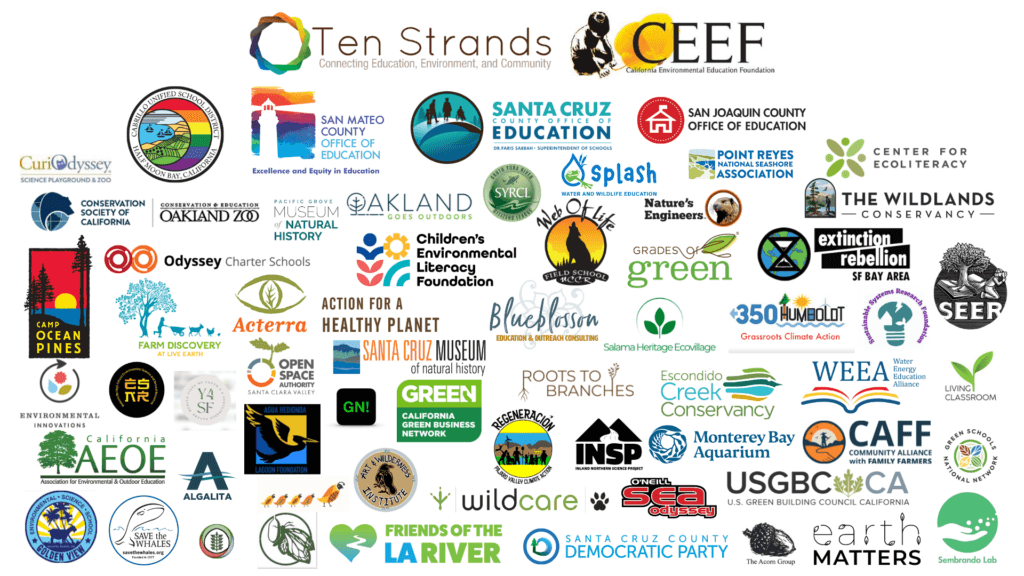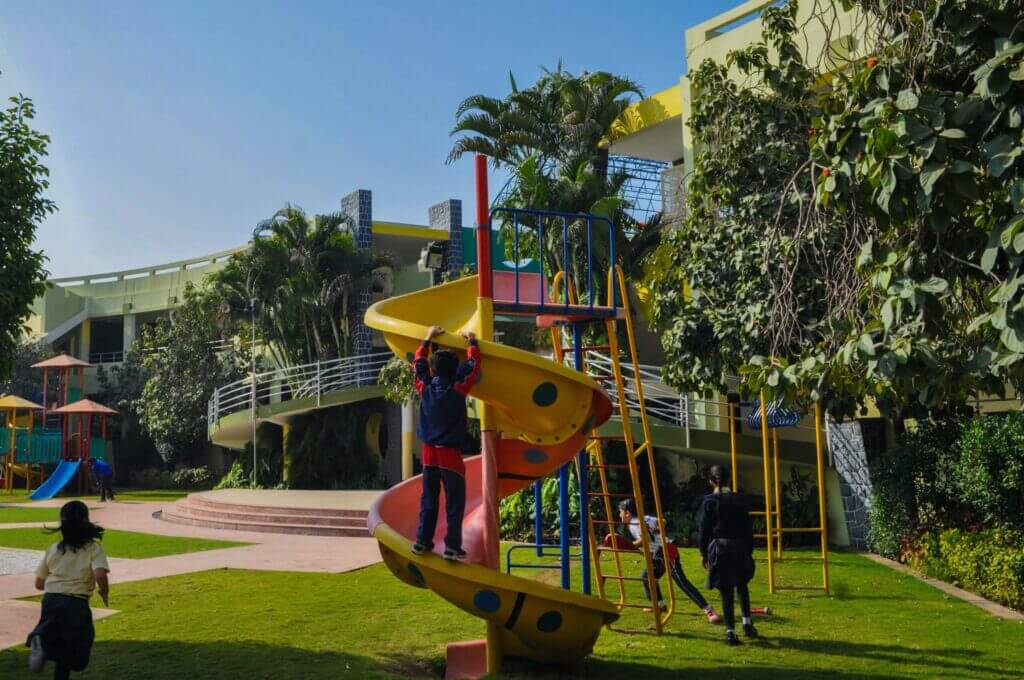Advocacy is one of Ten Strands’ three strategic pillars, where we work at the state level to meet the urgency of the climate crisis and the need for environmental justice by catalyzing change through an innovative whole systems approach. Our current advocacy includes the initiatives below that advance our mission to increase environmental literacy throughout the system of TK–12 public education in California.
K–12 Climate Change and Environmental Justice Program

WHAT: In July 2021, Ten Strands worked with Senator Ben Allen to secure $6 million to partner with the San Mateo County Office of Education (SMCOE) and the California Department of Education to develop K–12 climate change and environmental justice curriculum units. This investment made California the first state to publicly finance the creation of open education resources to enhance climate and environmental literacy.
IMPLEMENTATION NEEDS: Ten Strands and SMCOE are requesting $10 million over three years to build upon the state’s initial investment by supporting California county offices of education (COEs) and their local school districts in implementing these new curricular resources.
COEs are essential in helping districts, schools, and teachers create opportunities for students to develop environmental and climate literacy. Still, there are currently few sources of support to help COEs build the capacity to do this work. Ten Strands, SMCOE, and the California Environmental Literacy Initiative will come together to provide expertise and support to guide this implementation effort.
BUDGET REQUEST: We worked with Senator Ben Allen to request an additional $10 million to build upon and leverage the initial investment in curricular resource development. We have a vision of developing statewide professional learning centered around these new curricula and, at the same time, building support for the widespread implementation of the materials.
Learn more about the Climate Change and Environmental Justice Program here.
STATUS: We are actively continuing conversations with key legislators, state agencies, and our partner, the San Mateo County Office of Education.
GOALS FOR THE BUDGET REQUEST:
- Widespread implementation of the curricular resources.
- Multiple venues of professional learning for teachers and educational leaders.
- Mechanisms for productively adapting, augmenting, and sharing the curricula.
- Connecting teachers and students to community-based partners.
California K–12 Climate Change Education Voluntary Tax Contribution Fund

WHAT: Ten Strands and the California Environmental Education Foundation are co-sponsors of AB 3051 (Muratsuchi). This bill would establish the California K-12 Climate Change Education Voluntary Tax Contribution Fund, generating a sustainable funding base to support statewide climate change education.
IMPLEMENTATION NEEDS: California schools will be required to provide climate change education to all students in first through twelfth-grade science coursework in the 2024-25 school year, per AB 285 (Rivas). Widespread adoption and implementation of climate change education will require systematic and cohesive professional learning, ongoing coaching support, and structured leadership.
STATUS: AB 3051 was introduced to the California Assembly in February 2024 and passed unanimously through the Assembly Revenue and Taxation Committee. Our campaign in April 2024 gathered a total of 303 individual supporters and 76 organizations within just two days, clearly demonstrating a strong and fast-moving coalition of environmental literacy advocates.
On May 16, 2024, during a Senate appropriations committee hearing, the bill was held in ‘suspense,’ and will not move forward this legislative season. Despite the bill’s low administrative cost (<$150,000), California’s large budget deficit required the Legislature to scale back its agenda.
GOALS: The funds generated from the California K-12 Climate Change Education Voluntary Tax Contribution Fund would create the state’s first Climate Change Education Grant Program. The grant program will provide:
- Essential funding for teacher professional learning.
- California-focused, standards-based climate curriculum implementation.
- Collaboration with community-based organizations and higher education institutions.
- Student-driven environmental stewardship projects in school districts and county offices of education.
Climate Ready Schools Coalition and Master Plan

WHAT: Since 2022, Ten Strands has partnered with UndauntedK12 to co-lead the Climate Ready Schools Coalition. The Coalition focuses on initiatives that center on decarbonizing every school building to ensure school buildings and grounds are climate-resilient to support student health, safety, learning, and development in a time of rapidly increasing extreme weather.
2024 ADVOCACY FOCUS AREAS:
This Legislative season, the Coalition is focused on six advocacy priorities:
- SB 1182: State Master Plan for Climate Resilient Schools
- SB 1374: Protect Solar at Schools
- AB 247: Pass State School Bond Aligned with Climate Goals
- AB 691: Extend and Improve CalSHAPE
- SB 1091: Promote Schoolyard Greening and Shade
- Invest in Resilient Schools in the State Climate Bond
PAST WINS, PUBLICATIONS, AND ENGAGEMENTS:
- Climate Resilient Schools Report and Policy Forum: Many of the ideas for a statewide master plan stem from the Climate Resilient Schools Call to Action Report (released in March 2023) and the virtual policy forum on Climate-Resilient California Schools in April 2023.
- SB 394: Master Plan for Climate-Resilient Schools: Although the 2023 bill passed with overwhelming support in both the California State Senate and Assembly, Governor Newsom ultimately vetoed it, citing budgetary concerns.
- High Heat Policy Forum: Watch the December 2023 Virtual Policy Forum on Climate-Resilient California Schools here.
Additional Legislation We’re Supporting
AB 2038 (Quirk-Silva) State parks: Outdoor equity programs
AB 2939 (Rendon) Parks: Counties and cities: interpretive services
These bills support equitable access to parks and beaches for small, non-commercial outdoor equity programs. AB 2038 relates to State Parks, and AB 2939 impacts natural resource areas managed by cities and counties.
Photo Credits (Header: Hannah Arista | Photo 1: Kerry James | Photo 2: Hussain Badshah)
